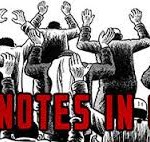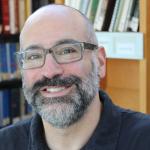Part 1: A Confessing Church, circa 1985
This is the KAIROS, the moment of grace and opportunity, the favorable time in which God issues a challenge to decisive action.
Challenge to the Church (“Kairos Document”), Johannesburg, South Africa, 1985
The mission of the Church is prophetic, to speak the Word of God courageously, honestly and lovingly in the local context and in the midst of daily events.
Kairos Palestine Document, Bethlehem, 2009
Johannesburg, South Africa, April 2011.
Why? I kept asking them. Why are you so wholeheartedly and passionately committed to this cause? Why little Palestine? You have massive problems here. The post-Apartheid era is proving more challenging in some ways than the struggle to end it, as you endeavor to find a way out of deep structural inequality and seemingly intractable economic divisions along racial lines.
The answers came without hesitation. First: The world was here for us during our struggle. Second: We know what Apartheid is. We cannot stand idly by. This must be our struggle as well.
I was in South Africa for the Kairos Southern Africa –Kairos Palestine encounter. Pastors, theologians and society leaders from Southern Africa, including many of the great – and outside of Africa, unsung – heroes of the anti-Apartheid movement, in addition to younger church people, had organized under the name Kairos Southern Africa. They had invited a delegation of Palestinian Christians, including many of the authors of the Kairos Palestine document, for a conference and a series of meetings with church, civil society and government leaders to launch Kairos Palestine in Southern Africa. But this meeting was more than a simple expression of solidarity with Palestinians struggling for freedom and self-determination. It was an affirmation of the overall mission of the church in Southern Africa. As one of the several non-African/ non-Palestinians and the only North American in attendance, I realized that this extraordinary gathering carried a critically important message for the church globally and in particular the church in the United States. In order to understand that message, we need to understand a bit about the history of the struggle with South African Apartheid.
As early as the late 1950s, statements began to emerge from South African church bodies expressing the fundamental conflict between Apartheid and Christian beliefs and principles. The church was beginning to confront, not only its silence in the face of racist laws, but the fact that it was practicing racial separation and discrimination within its own walls. Most important, the church was calling into question ways in which Christian doctrine had been employed and was continuing to be used to justify policies of separation and discrimination. By the 1980s, uprisings in the townships and brutal suppression by the government of all forms of resistance had brought the country to a boiling point. Anglican Bishop Desmond Tutu had assumed leadership of the South African Council of Churches and was taking an increasingly vocal stance against Apartheid.
In 1982 a watershed event occurred. The leaders of the World Alliance of Reformed Churches (WARC) met in Ottawa Canada. Nine black and coloured pastors from South Africa refused to partake of the Lord’s supper with their white colleagues because they could not do so at home in Apartheid South Africa. The World Alliance got the message: the WARC declared the church to be in status confessionis. Nothing moves, they declared, all other church business takes a back seat, until this betrayal of the core values of our faith is addressed. They then suspended the South African white Dutch Reformed Church member churches from the worldwide church body. These church leaders knew that not only was the church complicit in its silence, but that it had a responsibility for having helped create the very structures of separation and discrimination upon which the current state structures were built, and for having developed the original theological support for racist policies. They realized that this meant that the church was in violation of the fundamental principle of equality under God, the unity of all creation, and the dignity of all living things. In the words of the “Confession of Faith” of the Dutch Reformed Mission Church of South Africa (the “Belhar Confession”), written in 1982 and officially adopted in 1986, “we reject any doctrine which absolutizes either natural diversity or the sinful separation of people…or breaks the visible and active unity of the church…”
The Belhar Confession was followed in 1985 by a towering statement of theological courage, titled “Challenge to the Church” and signed by 150 South African theologians. Also known as the “The Kairos Document,” it was, in the words of South African journalist and biographer of Desmond Tutu John Allen “soon seen as one of the most important theological documents of its time.” The 1985 Kairos Document signaled the final stage of the struggle that culminated in the end of Apartheid in 1994. South African theologian and church historian John De Gruchy, the author of The Church Struggle in South Africa, has pointed out to me that church struggle has two meanings – the struggle was not only of the church with Apartheid, but with itself. This same observation was made to me by two other central figures in the anti-Apartheid struggle, theologian Albert Nolan and pastor and activist Frank Chikane. From the beginnings of the anti-Apartheid struggle and to its very end, the church was never totally united in principle and in action. But through the efforts of an increasing number of courageous individuals, and as the struggle intensified and the fundamental issues became more and more clear, the church found its prophetic voice, its feet squarely planted on the ground it knew it had to claim.
This is an example of theology in action – theology in response to history. In some circles, and at times when this kind of theology has threatened the church establishment itself, such theology has been dismissed as “contextual,” as if the doing of theology in direct response social conditions somehow diminishes faith or reduces faith to something less elevated than itself. Ulrich Duchrow, theologian and co-founder of Kairos Europa, has this to say about this claim: “Working sociologically does not mean restricting the meaning of biblical texts to so-called sociological questions but rather recognizing that socio-economic and political structures and ways of acting are, according to the insights of the Bible, to be addressed as a decision for or against God. It is the social questions that are theologized, and not the God question that is secularized” (Duchrow, U. Alternatives to Global Capitalism, International Books with Kairos Europa, the Hague, 1995, 142).
During my time in South Africa, this same point was driven home repeatedly in conversations with people and in encounters across South African society. In the words of Edwin Arrison, an Anglican priest and coordinator of Kairos Southern Africa, “Kairos Palestine is a blessing for us.” Solidarity with the Palestinian struggle, he was saying, puts our South African church in touch with our prophetic, faithful heart. It sets us more surely on the ground on which we as a church live spiritually, ground we have been in danger of losing since the end of Apartheid in our own country. The energy we put into Palestine, he said, does not diminish our energy to deal with our own issues, it augments it. I was told by a pastor from Swaziland that knowing about someone else’s troubles and struggle helps you understand your own — you don’t feel so isolated. For a Southern African, I learned, solidarity with the Palestinian struggle is not about taking on another burden or cause on top of the issues at home. It is not a net gain in responsibility – rather, especially in the context of the monumental challenges facing South Africa today, it makes the load lighter.
I heard Ronnie Kasrils, Jewish South African anti-Apartheid activist and politician, speak to a large group of young people from the black township of Khayelitsha in Cape Town one evening in the presence of the Palestinian and Southern African Kairos delegations. Rousing these black teenagers and young mothers and fathers living under conditions of extreme poverty to the cause of their Palestinian brothers and sisters, Kasrils spoke to the Palestinians on behalf all South Africans: “You are not alone,” he said, “we are with you! When we were fighting the Boers and were being mowed down in the townships, the world stood with us. When we heard that the people in the USA and the UK were supporting us and standing with us in boycotting South Africa, that meant everything to us. From up there to down here, the love is here for truth and justice and to stand for all people!” And the young people, some wearing “Free Shuhada Street” t-shirts (Shuhada is the main market street in Hebron in the West Bank, closed off to Palestinians to “protect” illegal Jewish settlers), rose to their feet and sang and danced to the hymn “We are Marching over to Jerusalem.”
We were hosted by the Muslim Judicial Council in Cape Town and were told by the Imam that the South African commitment to this struggle this is not only for Palestinians, or for Muslims, but for all of humanity. Officially endorsing the Palestine Kairos document, the leaders of the Council affirmed the need for Christians, Jews and Muslims to live together in peace in the Holy Land, as they had done for centuries.
We met with the Anglican Archbishop of Cape Town, Thabo Makgoba. Fresh from his recent visit to Bethlehem to address the international meeting of Sabeel, he had been to Palestine, he had seen the occupation, and he offered his full support. We met with the Catholic Archbishop of Cape Town, who had been there, and, fully understanding the importance of working for justice in Palestine, he offered his support in educating South African Catholics about the situation. But the congregation at the Cape Town Cathedral on the Sunday morning following the Kairos meeting had not been there, had not seen the oppression of the Palestinians first hand. And yet when Canon Naim Ateek of Sabeel preached that morning, speaking about the Palestinian plight, the similarities to Apartheid, and of the moral and theological imperative to support the Boycott Divestment and Sanctions campaign, he received enthusiastic applause – not a normal occurrence after a sermon in an Anglican cathedral! The worshipers that morning understood Apartheid because they had lived it. When the General Secretary of the South African Council of Churches met with the Palestinian delegation he was ready with concrete offers to distribute the Palestine Kairos document for study throughout the South African churches, and to work to ensure that pilgrimages to the Holy Land include exposure to the occupation and meetings with peace activists. Like the worshippers in the Cathedral that Sunday, he had not been to Palestine. But he could not fail to feel the pain of the Palestinians and to understand their suffering. And he knew what had to be done.
Kairos Consciousness
Liberation theologian, Uniting Dutch Reformed pastor and anti-Apartheid activist Professor Allan Boesak recently described Kairos consciousness in this way:
A Kairos consciousness is a critical consciousness. It discerns and critiques the situation in which we live. It understands that it is a situation of life and death. There is a conflict – between rich and poor, oppressor and oppressed, powerful and powerless, beneficiaries and victims, those who are included and those who are excluded. In that critique there is no room for sentiment and romanticism – peoples’ lives are at stake. The crisis we are facing is not just economic, social and political, it is a moral crisis…
The situation is one of extreme urgency precisely because the stakes are so very high. This calls for action and we respond with prophetic faithfulness and prophetic daring.
This movement is not simply a campaign in support of one popular struggle. It is not simply a movement to bring racial equality to one group of oppressed people. It is a global movement to delegitimize an Apartheid system that rivals the one that burned into the soul and the soil of South Africa until only two short decades ago. That regime was brought to an end, as it had to be, by the irresistible pressure of the oppressed people of South Africa and their allies among white South Africans, the global church, foreign governments called to account, and the enduring, persistent and spirit-infused human commitment to justice.
This is not only about Palestine. South African theologian Charles Villa-Vicencio, one of the authors of the 1985 Kairos document, had this to say to me when we met in Cape Town: “This is bigger than Palestine. It’s the fault line running through western civilization, the point of split in the first century between the followers of Jesus and those who clung to their Rome-granted power base in Jerusalem.” In other words, it’s about whether religion is used to separate groups from one another and to grant one group the right to dominate another, or whether it is about bringing humankind to a realization of our unity and connectedness. So the church was born to this. Indeed, the church was born in this. And the church is taking this on, in South Africa, in the U.S., in growing number of centers in Europe. And it is the church, globally, that will be crucial in ending the system that is destroying Israeli society, has hijacked the Jewish faith, continues to fuel global conflict, and has produced one of the most systematic and longstanding violations of human rights in the world today. What I experienced in South Africa a few short weeks ago convinced me that the energized South African church will be the leading edge of the global movement to end Apartheid in Palestine.
The other leading edge will be church in the United States.
To be continued in Part 2, “A moment of truth for the American church”











